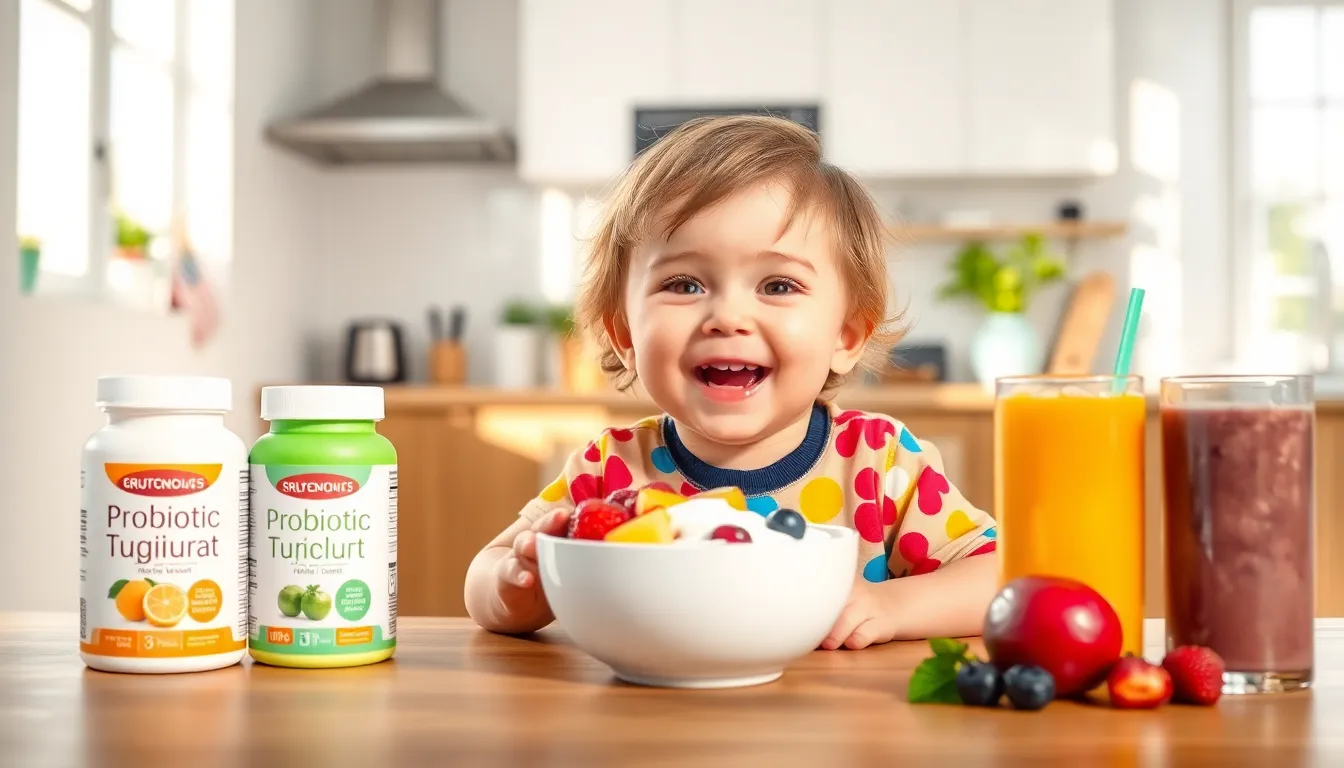When it comes to keeping toddlers happy and healthy, parents often find themselves navigating a minefield of choices. One option that’s gaining traction is probiotics, those tiny superheroes for the gut. Imagine if your little one had a secret weapon against tummy troubles and occasional crankiness—sounds like a win-win, right?
Probiotics can help balance the gut flora, promoting better digestion and overall well-being. Plus, they might even boost your toddler’s immune system, making it less likely they’ll bring home every germ from daycare. So why not give these friendly bacteria a chance? After all, a happy gut means a happy toddler, and who wouldn’t want that?
Table of Contents
ToggleUnderstanding Probiotics
Probiotics play a crucial role in toddler health. These beneficial bacteria help maintain a balanced gut microbiome, supporting digestion and overall wellness.
What Are Probiotics?
Probiotics consist of live microorganisms that provide health benefits, particularly for the digestive system. They come in various strains, such as Lactobacillus and Bifidobacterium. Foods like yogurt and supplements provide these essential bacteria, which support children’s gut flora.
Importance of Probiotics for Toddlers
Probiotics contribute significantly to a toddler’s gut health and immunity. They enhance digestion, allowing nutrients to be absorbed efficiently. Research suggests that probiotics may reduce the frequency of digestive issues, like constipation and diarrhea. Furthermore, they can strengthen the immune system, decreasing the risk of infections, especially in communal settings like daycare.
Benefits of Probiotics for Toddlers

Probiotics offer various advantages for toddlers, particularly in gut health and immune function. These beneficial bacteria, like Lactobacillus and Bifidobacterium, play an essential role in a toddler’s development.
Digestive Health
Probiotics improve digestive health by balancing gut flora. This balance promotes effective digestion and helps prevent common issues such as constipation and diarrhea. Additionally, beneficial bacteria enhance nutrient absorption from food. Therefore, including probiotics in a toddler’s diet supports regular bowel movements and alleviates digestive discomfort. Foods like yogurt are excellent sources of these microorganisms, making them a tasty option for young children.
Immune System Support
Probiotics strengthen the immune system, which is vital for toddlers in crowded environments like daycare. Research indicates that these microorganisms reduce the frequency and duration of infections. By maintaining a healthy gut, probiotics play a crucial role in the body’s defense against pathogens. As a result, toddlers who consume probiotics may experience fewer sick days. Parents can opt for probiotic-rich foods or supplements to enhance their child’s immune response and overall health.
Choosing the Right Probiotic for Toddlers
Selecting the ideal probiotic for toddlers involves understanding the types available and ensuring formulations match their age. Parents should consider these aspects carefully to maximize benefits.
Types of Probiotics
Probiotics typically fall into two main categories: Lactobacillus and Bifidobacterium. Lactobacillus supports digestion and reduces gastrointestinal discomfort. Bifidobacterium enhances immune function and improves overall gut health. Various strains within these categories offer specific benefits. For example, Lactobacillus rhamnosus can alleviate colic, while Bifidobacterium animalis promotes healthy bowel movements. Products that contain a combination of these strains often provide a more comprehensive approach to gut health for toddlers.
Age-Specific Formulations
Age-specific formulations cater to different developmental needs. Probiotics designed for toddlers often contain lower dosages of live cultures, ensuring safety and efficacy. Many products include additional nutrients like vitamin D, promoting immunity. Parents should look for those specifically labeled for toddlers, as these formulations consider age-related digestive challenges. Avoid products containing too much sugar or artificial additives, as these can negate health benefits. Always consult a pediatrician when determining the appropriate probiotic for a child’s specific health needs.
How to Introduce Probiotics to Your Toddler
Introducing probiotics to a toddler involves thoughtful considerations regarding dosage and dietary incorporation. Understanding the right amounts and methods helps maximize benefits.
Recommended Dosage
Experts recommend starting with a dosage of around 1 billion to 5 billion CFUs (colony-forming units) per day for toddlers, depending on the specific product and probiotic strain. Parents must agree with a pediatrician to identify the appropriate dosage based on individual health needs. Monitoring for any changes or reactions is important, especially when first introducing probiotics. Gradually increasing the dosage can help ascertain tolerability. The type of probiotic, whether it’s Lactobacillus or Bifidobacterium, also influences the recommended amount. Age-specific formulations cater to toddlers and often provide a guideline for dosages.
Tips for Incorporation into Diet
Incorporating probiotics into a toddler’s diet can be straightforward. Including yogurt with live cultures provides a tasty option that many toddlers enjoy. Smoothies blended with probiotic powder or flavored yogurt can disguise the taste while offering a nutritious boost. Other foods, like kefir or fermented vegetables, also serve as good sources. When using supplements, choosing gummy or powder forms can make consumption easier and more appealing. Parents should read labels carefully to ensure formulations are appropriate for toddlers. Making the introduction fun can encourage acceptance, such as involving toddlers in picking out products at the store.
Probiotics offer invaluable support for toddlers’ health and development. By promoting gut health and enhancing immune function, these beneficial microorganisms can help reduce the frequency of illnesses and improve overall well-being. Parents can easily incorporate probiotics into their child’s diet through yogurt, smoothies, or supplements tailored for toddlers.
Choosing the right probiotic is essential for maximizing benefits. Understanding the specific strains and formulations designed for young children can make a significant difference. With careful consideration and guidance from a pediatrician, parents can ensure their toddlers receive the support they need for a healthy and happy start in life.




